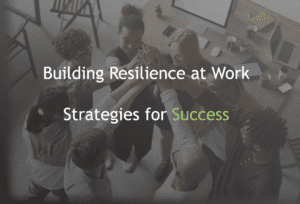Building Resilience at Work: Strategies for Success
In today’s fast-paced and ever-changing work environment, resilience has become a vital skill for professionals across industries. The ability to adapt, bounce back from setbacks, and maintain mental and emotional well-being is essential for long-term success and satisfaction in the workplace. This article aims to provide practical strategies that can help individuals boost their resilience and thrive in their professional lives.
Cultivate a Growth Mindset:
Embracing a growth mindset is the first step towards building resilience. Understand that challenges and failures are opportunities for growth and learning. Instead of viewing setbacks as personal shortcomings, consider them as stepping stones to improvement. Embrace a positive and proactive attitude towards change and seek out new experiences that challenge and expand your skills.
Develop Strong Relationships:
Building a supportive network of colleagues and mentors is crucial for enhancing resilience. Cultivate positive relationships at work, nurturing open communication and collaboration. Engage in meaningful conversations, share your challenges, and seek advice when needed. Having a strong support system can provide valuable perspectives, emotional support, and encouragement during difficult times.
Practice Self-Care:
Maintaining your physical and mental well-being is fundamental to resilience. Prioritise self-care activities that recharge and rejuvenate you. Regular exercise, adequate sleep, and a balanced diet can significantly enhance your ability to handle stress and adapt to challenges. Incorporate mindfulness or meditation practices into your routine to cultivate emotional stability and clarity of mind.
Set Realistic Goals:
Establishing clear and achievable goals is essential for maintaining focus and resilience. Break down larger objectives into smaller, manageable tasks, and celebrate incremental achievements along the way. This approach will help you stay motivated, build confidence, and maintain a sense of progress, even in the face of adversity.
Develop Problem-Solving Skills:
Resilient individuals are adept problem solvers. Enhance your problem-solving abilities by adopting a systematic approach. Analyse challenges objectively, break them down into manageable components, and explore potential solutions. Evaluate the pros and cons of each option before taking decisive action. Remember that setbacks can often present opportunities for creative problem-solving and growth.
Foster Flexibility and Adaptability:
The ability to adapt to changing circumstances is a hallmark of resilience. Embrace flexibility and remain open to new ideas, perspectives, and approaches. Develop a willingness to adjust your plans when necessary and embrace change as an opportunity for growth. Cultivating adaptability will help you navigate unforeseen challenges and seize new opportunities with confidence.
Seek Meaning and Purpose:
Finding meaning and purpose in your work can significantly contribute to resilience. Understand the impact of your contributions and connect with the broader purpose of your organisation. Reflect on how your skills and expertise positively influence others and contribute to your professional field. Connecting your work to a sense of purpose and larger goals can enhance motivation and resilience during challenging times.
Conclusion:
Building resilience is an ongoing journey that requires self-awareness, practice, and a proactive mindset. By implementing these strategies, individuals can enhance their ability to navigate workplace challenges, maintain well-being, and thrive in their careers. Remember that resilience is not about avoiding difficulties, but about developing the skills and mindset necessary to overcome them and grow stronger in the process. Embrace these practices, and empower yourself to embrace change, adapt to adversity, and flourish in your professional journey.

